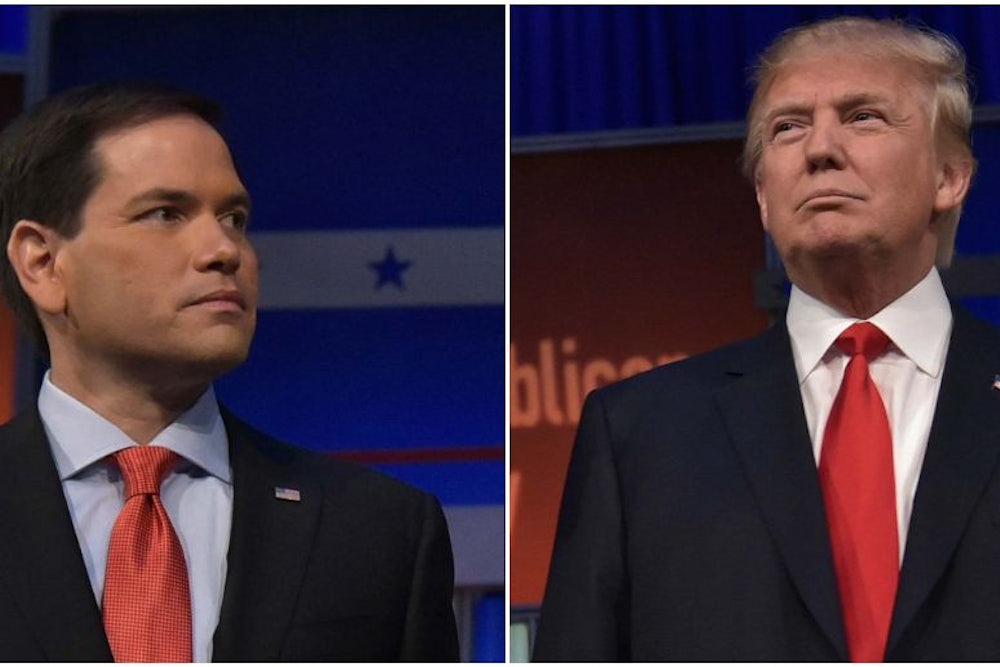Of all the Republican presidential candidates who enjoy significant support among both potential donors and party officials, Senator Marco Rubio stands out as the one who’s executing a deep and intelligent campaign strategy. Unlike now-former candidate Scott Walker, Rubio isn’t grasping for new messages and issue positions on the basis of polling fluctuations or news cycles. Unlike Jeb Bush, the logic to his candidacy extends beyond a tremendous fundraising apparatus. Unlike Governor John Kasich, he isn’t making a roulette-like bet on winning a single, early primary state.
But Rubio's game plan is working in part because it isn’t working very quickly. Rubio’s still stuck in fourth or fifth place in polls—high enough to be a contender in a 15-person field, but low enough to avoid the kind of public scrutiny and political bludgeoning that often spoils superficially viable candidates.
That’s about to change, thanks almost entirely to Donald Trump. To an unappreciated extent, Rubio’s emergence as the party’s consensus candidate will depend less on his ability to unite its disparate factions than on his ability to weather the coming Trump onslaught without falling to pieces the way Bush and Walker did, and, ideally, to inflict some damage on Trump in the process.
Rubio seems to understand Trump's real weaknesses—not that he's some kind of cryptoliberal, but that behind the facade he's not particularly dominating, and that the facade itself is designed to protect thin skin. In a Thursday appearance on Kentucky Sports Radio, he called Trump an “insecure,” “touchy” person who “takes shots at everybody that gets close to him, in terms of a poll, or anytime he hits a rough spot." One of those rough spots, Rubio said, was his weak showing in the second Republican debate.
His attack wasn’t unsolicited. Trump has been chiding Rubio for several days, attuned to a growing awareness that Rubio’s strategy is paying dividends. But Trump's critique thus far has been characteristically superficial and juvenile: Rubio’s too young. He’s too sweaty. His Senate attendance record is wanting, and he’s relatively poor for a national politician, due in part to too much credit card debt.
These are potentially damaging lines of attack so far as they go. But what distinguishes Rubio from Walker and Bush are recent substantive heresies and tactical errors, which have left him no quarter in either the party establishment or among the base.
Trump alluded to one of those heresies glancingly this week.
Senator Marco "amnesty" Rubio, who has worst voting record in Senate, just hit me on national security-but I said don't go into Iraq. VISION
— Donald J. Trump (@realDonaldTrump) September 23, 2015It’s not just that Rubio once supported comprehensive immigration reform and now doesn’t. It’s that he wrote, lobbied for, and then later renounced legislation that would've done exactly the thing that has Trump’s supporters in such a lather. By disavowing it, he damaged his reputation for trustworthiness and commitment among the immigration reform supporters in his party—Senator John McCain was “disappointed”; Senator Lindsey Graham said Rubio “changed stripes.” It remains unclear whether he’s paid enough penance to regain the trust of conservatives, who want the government to be significantly more antagonistic toward undocumented immigrants than it currently is.
So Rubio will be on his own when Trump starts attacking him for sticking his neck out to pass immigration reform, and then pulling it back. But he’ll also be vulnerable to different kinds of attacks. Part of Trump’s appeal to the white working class is a promise not to preserve special tax cuts for ultra-wealthy investors and investment managers. Republican Party orthodoxy holds that the wealthy pay too much tax, but the party’s base doesn’t share this view. This becomes a potential problem for Rubio because Rubio has proposed to zero out capital gains taxes altogether. If confronted, Rubio will respond with bromides about the growth-unleashing power of low investment taxes. But those kinds of pat answers of will be uniquely ineffective against Trump, who has managed to succeed in business at multiple different capital gains tax rates, and is willing to bring Rubio’s own financial failures into the argument to dramatize the point.
Rubio is one of the most poised and disciplined Republicans in the field, and confident enough in his chances that he opted not to simultaneously seek reelection to his Senate seat in Florida. But nobody really knows how well he’ll fare when he’s the target of a sustained political blitz—whether he'll get frazzled and trip over his own feet like Bush, or roll with it and counterattack effectively. The answer could define his career.
